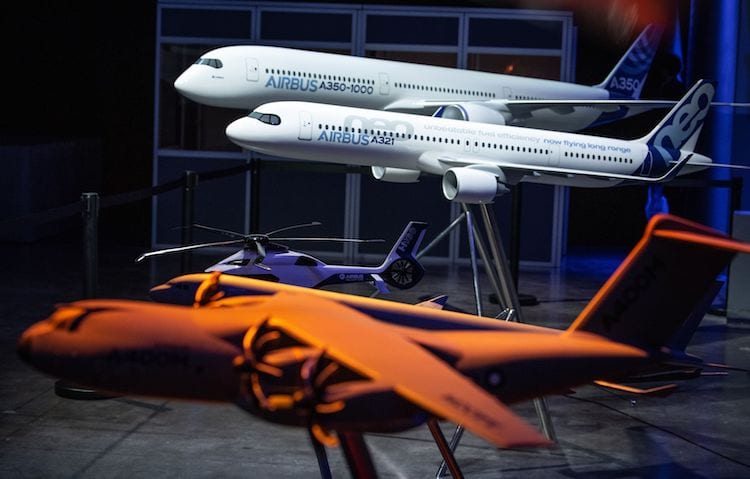
Airbus aircraft models at the annual conference in Toulouse. Photo: Airbus
The A350 is now the flagship passenger jet for Airbus, after the manufacturer made a financial decision to end production on the A380, executives said during their annual conference in Toulouse, France, on Thursday.
A380 deliveries will continue through 2021, and the four-engined jet will have maintenance and component support from Airbus for as long as airlines continue to fly it. However, with only 17 orders in the backlog remaining, the end of Airbus CEO Tom Enders’ reign will also mark the end of A380 production.
A final decision was made to cease production on the A380 after Emirates’ recent decision to reduce its existing A380 order by 39 aircraft, leaving just 14 on backlog to be delivered to the Middle East carrier. The remaining three A380s on order will go to Japanese airline All Nippon Airways (ANA).
Boeing has also struggled to capture enough orders to keep its own four engined jet, the 747-8, in production, with just 24 currently remaining.
Enders, who will retire as CEO of Airbus on April 10, 2019, said the decision effectively marks the end of an era.
“What we’re seeing here is the end of the large four engine aircraft and that is what it is,” Enders said.
While the A380 remains popular with airline passengers because of its double decker interior and massive appearance, Airbus has not been able to find enough customers for the aircraft to keep the program in production. Airbus previously considered adding new engines to the 525-seat aircraft, but ultimately decided against that and also scrapped plans to introduce a larger variant as well.
As production comes to an end, Enders reflected on lessons learned from the program and some of the technologies that were first deployed on the A380 that are now found in new generation aircraft such as the A350 and A320neo. For example, the A380 was the first Airbus passenger jet to feature the avionics full-duplex (AFDX) switched Ethernet bus and an integrated modular avionics architecture, which has also become standard on today’s Airbus passenger jets.
“If I look at the flight deck, there’s a lot of commonality between the flight deck of a 380, and the 350, we’ve advanced certain features of the flight deck of the avionics, of the automation brake to vacate for the 350 and certainly many many other examples,” Enders said.
With A380 production coming to a close, that now leaves the A350 as the largest Airbus passenger aircraft, with the A350-1000, the largest variant, entering into service last year. While Emirates significantly reduced their A380 order, the airline restored the confidence of Airbus to position the A350 as its future flagship aircraft by placing a new order of 40 A330-900 and 30 A350-900 aircraft. The Middle East carrier also previously canceled a $16 billion 70-plane order for the A350 in 2014, citing doubts about performance prior to its 2015 entry into service.
Guillaume Faury, who will replace Enders as CEO, believes the A350 will become the new flagship aircraft for Airbus.
“I think the answer is the A350 will be the product that’s going to lead the pack for Airbus. It’s very close to the A380 in terms of passengers’ experience, [where] the A380 is the benchmark, A350 is very close,” Faury said.
Moving forward, Faury said the focus for Airbus will be to continue to ramp up the production rate on the A320 and A350. The company will also continue to evolve its new Skywise digital aircraft operations platform. A newly-signed partnership with Dassault targeting the use of model-based engineering and three-dimensional design technologies will also be a focus for the new chief executive.
However, Faury also made clear that in the future, Airbus is more focused on moving toward the development of electric-powered aircraft and is not interested in entering the race to bring supersonic passenger travel back.
“We want to go electric, we think this is the main challenge that is in front of us,” Faury said.
“I think that for engineers, supersonic is fantastic, the predecessors of Airbus have worked on it. What is very important from my perspective is there is a fair balance of regulations for whatever flies in the air. We will not put a priority on supersonic,” Faury said.